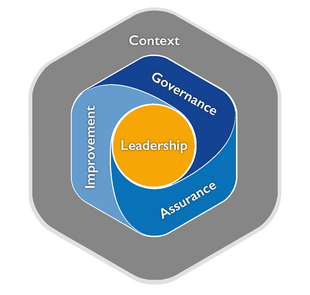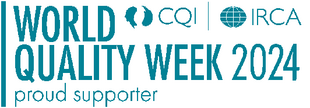
Leading the quality profession with enhanced skills and knowledge

For World Quality Week 2024, Mike Turner, Head of Profession, CQI, explores the opportunities for quality management practices in today’s rapidly changing world. Quality professionals who develop new skills, knowledge and effective leadership behaviours will leverage influence in their organisations and in responding to global issues.
The world in which all professionals operate is changing so rapidly that continuous professional development has never been so important. Patterns of work have been fractured by the effects of the pandemic and remoulded by rapidly emerging technologies. And all this in a world that faces threats from geopolitical tensions, trade restrictions, shortages of essential resources and the evolving climate crisis.
But why should a quality professional care about all of this? Aren’t the problems so vast that it's easy to become overwhelmed? Isn't there a temptation to keep going and hope that things settle down to a new norm? Well, I’d argue not. I believe that it’s up to everyone to play their part. Professionals must lead the way in their disciplines and ours is no exception.
Acquiring new skills and knowledge to deliver value
Recognising the fluidity of organisational life, the risks and opportunities that digital technologies present and the need for innovative and urgent action to address the climate crisis, one could ask of a profession that touches most of what goes on in the workplace:
- Who’s going to lead the way in assuring the adoption of new technology? Who’s going to advise on the best ways to regulate the use of AI? How will organisations protect themselves against the risks of failure created when business models are remodelled at pace?
- Who’s going to help translate contextual risk into operational assurance and controls? Who’s going to help design the right approach to assurance that breeds confidence without stifling progress?
- Who’s going to advise on the structuring and re-structuring of business models that will deliver the right quality of outcomes?
- Who’s going to ensure that organisations become and stay agile?
- Who’s going to describe and encourage the right culture that acts as the conscience of the business and avoids high-impact failures?
I believe that the answers to these and other important questions we face today lay in the practices of quality management.
It’s up to us, as quality professionals, to step into the moment and deliver real value. But while we may already feel equipped to address these issues, recent research by the CQI has highlighted challenges for the profession that will require us to go beyond what has worked so far.
Mike Turner, Head of Profession, CQI
The CQI believes that quality professionals must acquire new skills and knowledge, and display the right leadership behaviours, to have greater influence. In 2014, the CQI launched the Competency Framework, a simple model of professional competence, expressed in five interrelated elements of Governance, Assurance, Improvement, Context and Leadership. Over the past 10 years it has attracted interest internationally, and in a recent survey of members, over half of the respondents had referred to the framework at some point.
With these new changes and challenges, we asked ourselves if it was enough to guide professional practice. Through engaging our members, we understood they needed a more detailed description of competence. They needed a tool to create their own tailored development plans and support to help them to develop the technical and leadership skills required to address current and future challenges.
In response, the CQI launched the new Profession Map in 2023. The primary purpose of the map is to provide a simple, and easily navigable statement of competence for each element of the original framework. This is meant to describe the many different aspects of the work of quality professionals, fit for today and the future.
Influential and effective leadership
Leadership competence emerged as a growing importance for quality professionals focused on delivering value and helping to address today's global challenges. It will not be enough to implement quality management systems, methods and tools.
It will be great leadership that finds the right approaches, sets them in the context of the business, and coaches and motivates the organisation to deliver excellence in quality.
Mike Turner, Head of Profession, CQI
Our research has concluded that effective leaders in quality must use the right behaviours to maximise influence and develop a culture of evaluation and improvement. Such a culture is critical to meeting the challenges we are facing in our organisations and globally.
These behaviours fall into four key components of competence:
- Being the conscience of the business as quality professionals provide support and guidance to others in relation to advocating for quality and for the interests of stakeholders, and act as champions for improvement and change. The risks presented by having to enact such a scale of change, at pace, will place an importance on those who are the 'voice of conscience' for the business.
- Showing others how the disciplines and practices of quality management can deliver essential value as companies compete to adjust to new dramatic trends. This requires the professional to embrace and exhort others to see the organisation as one whole system, within a broader value network. They should advocate a fact-based approach to decision making and build systems that prevent failure by ‘building quality in’ from the outset.
- Facilitating others to deliver quality excellence in everything they do, and that the organisation produces. Professionals should frequently coach and motivate others to deliver excellence in quality. This will increasingly involve collaboration across multiple disciplines. The challenges of this next decade will not be achieved unless we are all pulling together.
- Being a role model for the profession and the discipline of quality management. We should be recognised for our professionalism and seek to help others develop their professional behaviours, skills and knowledge. Increasingly, the power of AI and the demands of climate change will challenge business ethics, and our profession must lead the way.
We all know that the world continues to change at pace. The professions must lead the way in helping the world to figure it all out and adapt accordingly. The quality profession is no different but there is work for all of us to do in competence development, for our teams and ourselves. This will require mature and effective leadership skills.
The Profession Map gives our profession a way forward. It is important that it is used and improved. In doing so the combined experience and expertise of the global body of professionals will make it even more powerful. And in so doing, every participant can be justifiably proud to have been part of the global conversation on research and development that will ensure the quality professional remains fit for today and the future.
Be part of shaping the future of quality. Explore The Profession Map today and contribute to the global conversation, helping to advance our profession for the challenges of today and tomorrow.
The Profession Map

Your route to success - equipping modern quality leaders to meet evolving business demands.
Become a member
Take your quality career to the next level by becoming a member of the CQI or an IRCA Certificated Auditor.

